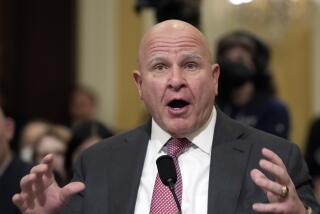A Not-Always-Diplomatic Gathering
- Share via
WASHINGTON — Around the polished table in the Roosevelt Room sat former officials who had been involved in prosecuting nearly every U.S. military action since the Vietnam War or in the diplomatic efforts to end them.
They were there at the invitation of the current occupant of the Oval Office, who sought advice Thursday from 13 former secretaries of Defense and State who, collectively, had served every president from John F. Kennedy onward.
The 12 men and one woman came to the White House to hear President Bush make his case for the Iraq war as the military operation there nears the end of its third year, and to present suggestions and recommendations as the administration faces what one military briefer reportedly told the group would be “a very dangerous six months” in Iraq.
In the end, said Melvin R. Laird, Defense secretary during President Nixon’s first term, “some of the things [Bush] heard, he probably didn’t like too well.”
White House Press Secretary Scott McClellan had a slightly different take on the discussion: “There were a number of constructive ideas or suggestions that they had of things that maybe we ought to do differently,” he said.
The former officials represented a spectrum of political, military and diplomatic thinking that, if not as broad as that reflected in American political life, encompassed the divergent wings of mainstream politics, Republican and Democrat.
Madeleine Albright, President Clinton’s second secretary of State, has publicly criticized the decision to invade Iraq and has said that parts of the world hold the United States in a poor light because of the invasion.
She made the same points at the White House, an Albright aide said, telling Bush that he had started “a war of choice, not of necessity -- but getting it right is a necessity and not a choice.”
Bush and a number of the participants said some of them disagreed about whether he was right to invade Iraq but agreed that, with American forces deployed throughout the country, the United States had to be certain of success.
The president said the meeting, which had been scheduled for 45 minutes but lasted about an hour, had given him “a chance to listen to their concerns, their suggestions about the way forward.”
“Not everybody around this table agrees with my decision to go into Iraq. I fully understand that,” Bush told reporters during a photo session at the end of the meeting. “But these are good, solid Americans who understand that we’ve got to succeed now that we’re there.
“We take to heart the advice,” he said.
The meeting represented a turn in the administration’s effort to gain support for the war -- in this case by reaching out to occasional critics, as well as supporters, who take part in the public debate on Sunday morning talk shows and in newspaper opinion pages.
William S. Cohen, secretary of Defense during Clinton’s second term, said no one at the meeting called for immediate U.S. withdrawal from Iraq.
“I don’t think anyone walked in there believing this would be a real opportunity to effect changes in policy,” Cohen said in a telephone interview after the session.
Rather, he said, Bush talked energetically about the need to remain on the current course -- what Cohen described as “a symbolic reading-out” of the current conditions.
Cohen said a senior military officer forecast “a very dangerous six months coming up,” with insurgents trying to undermine the political progress that the administration says Iraq’s recent elections have demonstrated.
To some extent, the participants -- all of whom had, over the years, wrestled with problems similar to Bush’s -- were a study in discretion.
“You have to understand -- when you’re in the presence of the president of the United States ... you are likely to pull your punches to some degree,” said Lawrence S. Eagleburger, secretary of State at the end of President George H.W. Bush’s administration.
“We’re all has-beens anyway,” he said.
The White House said that besides Laird, Albright, Cohen and Eagleburger, the participants were former secretaries of State Colin L. Powell, James A. Baker III, George P. Shultz and Alexander M. Haig Jr. and former secretaries of Defense William J. Perry, Frank C. Carlucci, Harold Brown, James R. Schlesinger and Robert S. McNamara.
Also there were Secretary of Defense Donald H. Rumsfeld and Secretary of State Condoleezza Rice, as was former Defense Secretary Dick Cheney in his capacity as vice president.
A few former secretaries did not attend, including Warren Christopher, Clinton’s first secretary of State, who an aide said had a conflicting appointment in California, and Henry A. Kissinger, secretary of State under Presidents Nixon and Ford, who an aide said was about to have surgery on a broken shoulder.
More to Read
Sign up for Essential California
The most important California stories and recommendations in your inbox every morning.
You may occasionally receive promotional content from the Los Angeles Times.










